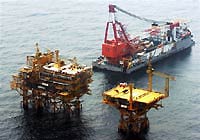Nigerian unions launch general strike over raised fuel prices
Nigeria's powerful labor unions launched a general strike Wednesday to protest government price hikes, leaving many schools and banks shuttered and normally bustling streets quieter in Africa's oil giant.

The unions, including Nigerian workers in the oil industry, rejected concessions by new President Umaru Yar'Adua's government on Tuesday aimed at averting the action and said Wednesday the work stoppage was under way.
"The strike is going on. The people have complied," said Owei Lakemfa, a spokesman for the umbrella Nigerian Labor Congress.
Some streets in Lagos, sub-Saharan Africa's biggest city, were quieter than usual and many schoolchildren stayed home. Banks and businesses remained closed in many areas of the city of 13 million people.
In the capital, Abuja, some schools were open. But union members blocked the main road from the airport into the city center with barricades of tires and tree limbs. Bank workers said by telephone that union members were preventing them from opening their doors to the public.
Late Tuesday, the government rejected labor's last demand - to fully roll back a 15 percent increase on automobile fuel, instead of halving the increase - and called on Nigerians to ignore the strike.
"Government urges all law-abiding Nigerians and international residents to go about their business and resist any attempt by any individual or group to use them to obtain political objectives masked as agitation in defense of the public interest," the government said in a statement.
"All steps have been taken to ensure the safety and security of any citizen or foreign resident going about their lawful business," it said.
The unions, upset over price increases, have said they would target the strike action at the oil industry, with the aim of staunching oil exports that count for 90 percent of the government's income. Oil prices rose to nine-month highs in global markets on the news.
Nigeria is Africa's biggest oil producer. It was the third-biggest exporter of oil to the United States in March, behind Canada and Mexico, with an average of 1.35 million barrels a day, according to U.S. Energy Department statistics.
There was no immediate word on the strike's impact on the oil industry. The workers that could most easily cut off the flow of oil from Nigeria work at collation and export installations deep in the vast Niger Delta region.
The unions, which claim to have a membership of 5 million in a country of 140 million people, called the strike Monday to protest the government measures ordered by ex-President Olusegun Obasanjo in the waning days of his administration.
He handed over to Yar'Adua on May 29, marking Nigeria's first-ever transfer of civilian-held power since independence from Britain in 1960.
Automobile fuel in Nigeria is heavily subsidized by the federal government, which says it wants to end the practice to free up cash.
Impoverished Nigerians see cheap fuel as one of the few benefits they derive from their famously corrupt state. Despite nearly 40 years of oil production that has brought the government hundreds of billions of dollars, most Nigerians live in poverty.
While Nigeria is one of the world's biggest oil producers, virtually all of its refined fuel is re-imported from overseas at great cost. One liter of fuel in Nigeria costs around 60 U.S. cents after government subsidies.
The unions are calling for solidarity from all Nigerians, saying vehicles should stay off roads. Many Nigerians, however, live subsistence existences and need to work each day to buy food. Not all previous strikes have succeeded, either in attracting widespread support, or cutting off the flow of oil from Nigeria.
Subscribe to Pravda.Ru Telegram channel, Facebook, RSS!


